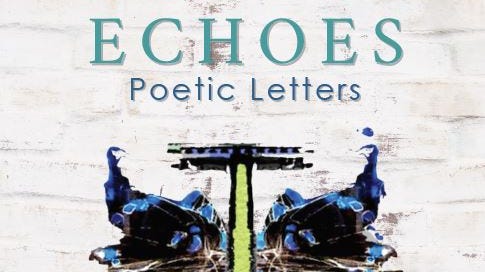The Starbeck Orion Issue #9 Showcasing: Alan Parry, Page 5 of 25
A Feast Of Words And Image
Here's a link to Alan’s latest published writing: Peeling Apples:
https://amzn.eu/d/1wcrqRt
Festschrift Interview
Q:5. Where did you get the idea for "Echoes"?
Echoes came out of a specific moment in my development as a writer. It began with the Rihannon Evans Prize during my MA in Popular Culture at Edge Hill, I submitted ten fruit-themed poems that didn’t win, but placed well and received positive feedback. That gave me confidence, but more importantly, it made me curious. Hungry. Even at that early stage, I felt like I was standing at a crossroads, ready to try something completely different.
Up until then, Neon Ghosts had been all mood and texture. It wasn’t derivative, but it wore its influences on its sleeve: curating tone, crafting voice, and building atmosphere like a collage. It had style, and it had something to say. But with Echoes, I wanted to burn that down (forgive that phrase, I've been watching a lot of pro-wrestling recently and Seth Rollins' The Second Coming is kind of etched into my brain as a result). I wanted Echoes to get personal. I wanted to mine my own life and see if the page could hold the weight of that.
At the centre of Echoes is Sylvie, a monologue play that fictionalises my nan’s life, stripped of joy. It’s bleak and unsparing, and it anchors the whole collection. Everything else in that book pushes against it, leans on it. That text changed how I wrote. It cracked something open.
Looking back at my writing 'career', Echoes is the outlier. The most realism I’ve employed in poetry. I haven’t returned to that terrain full-throttle since, maybe once or twice. Not because it failed, quite the opposite. It worked. It taught me something. And then I moved on.
Twenty Seven came next. A love letter to, or maybe an interrogation of, Jim Morrison. That one circled back to the stylings of Neon Ghosts, but with sharper tools and more confidence. That collection sits closer to where my voice naturally lives.
If anything mirrors the rawness of Echoes, it’s my recent novella, Peeling Apples. Same emotional weight, but with greater depth. In fiction, I’m still experimenting. But in poetry? I’m done auditioning. I know what I’m doing. I know what I’m saying. And I’m not writing to be liked or even published any more.
If it lands, great. If it doesn’t, I can live with that.
Q:5.1. What is it about "rawness" that speaks to you?
I respond to rawness because I’m not interested in pretending things are okay when they’re not. In life or in art. There’s too much performance out there already. Submissions? Acceptances? Rejections? Who gives a fuck. I’m not here for the optics. I want my writing to feel like something unfiltered has made it to the page. Crying and covered with vernix.
Rawness matters because it’s where honesty lives. Not curated vulnerability. Not aestheticised pain. Just the truth, however awkward or unresolved. That’s the writing that lands hardest. Poets like Andrew McMillan do it best! His writing is not trying to impress or posture. It just says: this is how it feels right now. And that’s enough.
Importantly, I’m not writing to be seen. I write because I need to. Some know me as a writer, some as an editor. That’s fine by me. I’m not chasing titles. I just keep doing the work. There'll be no Alan Parry circle-jerks on my watch!
I only care about writers who write like it matters to them. That’s rawness, as I see it. That’s what I want from poetry. That’s what I try to offer. Not polish. Not posture. Just presence.






